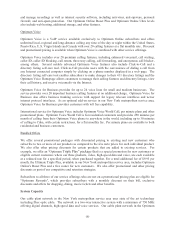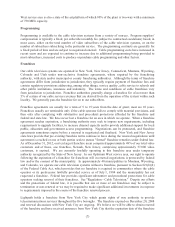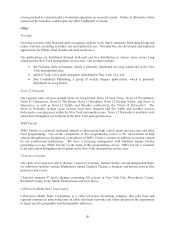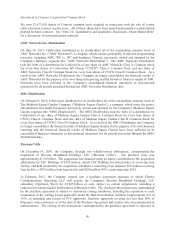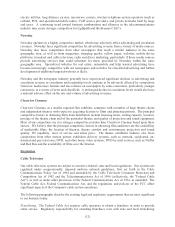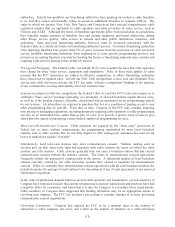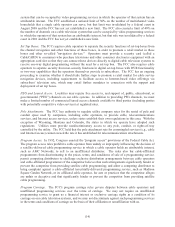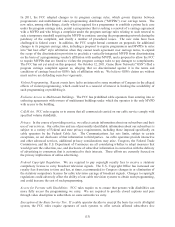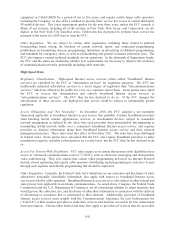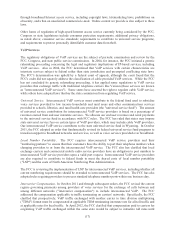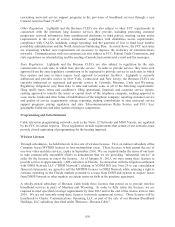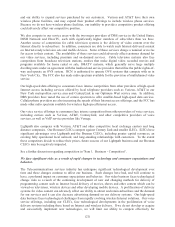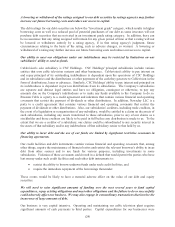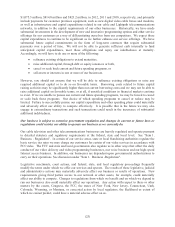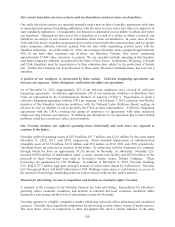Cablevision 2012 Annual Report Download - page 22
Download and view the complete annual report
Please find page 22 of the 2012 Cablevision annual report below. You can navigate through the pages in the report by either clicking on the pages listed below, or by using the keyword search tool below to find specific information within the annual report.(16)
equipment or CableCARDs for a period of one to five years, and require certain larger cable operators,
including the Company, to also offer a solution to provide basic service tier access to certain third-party
IP-enabled devices. This latter requirement applies for the next three years, unless the FCC extends it.
Many of our systems, including all of the systems in New York, New Jersey, and Connecticut, are all-
digital; in the New York City franchise areas, Cablevision has encrypted its systems' basic service tier
pursuant to the terms of a 2010 waiver from the FCC.
Other Regulation. We are subject to various other regulations, including those related to political
broadcasting; home wiring; the blackout of certain network, sports, and syndicated programming;
prohibitions on transmitting obscene programming; limitations on advertising in children's programming;
and standards for emergency alerts, as well as telemarketing and general consumer protection laws. The
FCC also imposes various technical standards on our operations. In the aftermath of Superstorm Sandy,
the FCC and the states are examining whether new requirements are necessary to improve the resiliency
of communications networks, potentially including cable networks.
High-Speed Data
Regulatory Classification. High-speed Internet access services (often called "broadband" Internet
services) are classified by the FCC as "information services" for regulatory purposes. The FCC has
traditionally subjected information services to a lesser degree of regulation than "telecommunications
services," which are offered to the public for a fee on a common carrier basis. Some parties have asked
the FCC to reverse this determination and classify broadband Internet access services as
"telecommunications services." The FCC thus far has declined to do so. If the FCC changes the
classification of these services, our high-speed data service could be subject to substantially greater
regulation.
Access Obligations and "Net Neutrality." In December 2010, the FCC adopted a net neutrality
framework applicable to broadband Internet access service that prohibits wireline broadband providers
from blocking lawful content, applications, services, or non-harmful devices, subject to reasonable
network management as defined by the rules; bars such providers from unreasonably discriminating in
transmitting lawful network traffic over a consumer's broadband Internet access service; and requires
providers to disclose information about their broadband Internet access service and their network
management practices. These rules went into effect in November 2011. The rules have been challenged
in federal court. Some parties have advocated that the FCC also require broadband providers to make
transmission capacity available to third parties on a resale basis, but the FCC thus far has declined to do
so.
Access For Persons With Disabilities. FCC rules require us to ensure that persons with disabilities have
access to "advanced communications services" ("ACS"), such as electronic messaging and interoperable
video conferencing. They also require that certain video programming delivered via Internet Protocol
include closed captioning and require cable operators distributing such programming to end users to pass
through such captions and identify programming that should be captioned.
Other Regulation. Currently, the Federal Cable Act's limitations on our collection and disclosure of cable
subscribers' personally identifiable information also apply with respect to broadband Internet access
service provided by cable operators. Broadband Internet access service is also subject to other federal and
state privacy laws applicable to electronic communications. As noted above, Congress, the Federal Trade
Commission and the U.S. Department of Commerce are all considering whether to adopt measures that
would govern the collection, use, and disclosure of subscriber information in connection with the delivery
of advertising to consumers that is customized to their interests. Additionally, providers of broadband
Internet access services must comply with the Communications Assistance for Law Enforcement Act
("CALEA"), which requires providers to make their services and facilities accessible for law enforcement
intercept requests. Various other federal and state laws apply to providers of services that are accessible


